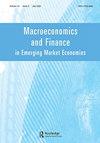具有人力资本积累的真实商业周期模型:保加利亚的经验教训(1999-2018)
IF 1.1
Q3 ECONOMICS
Macroeconomics and Finance in Emerging Market Economies
Pub Date : 2021-06-29
DOI:10.1080/17520843.2021.1937259
引用次数: 0
摘要
摘要:我们将人力资本积累引入真实的商业周期设置中。我们根据引入货币发行局安排后(1999-2008年)的保加利亚数据校准了模型。我们调查了技能获取对保加利亚周期性波动的数量重要性。在对烟雾模型进行一系列测试后,我们发现这种通道的定量效应——除了使小时的可变性适度增加之外——相对较小。换言之,政府在教育方面的支出在平滑周期方面是一种无效的工具。本文章由计算机程序翻译,如有差异,请以英文原文为准。
A real-business-cycle model with human capital accumulation: lessons for Bulgaria (1999-2018)
ABSTRACT We introduce human capital accumulation into a real-business-cycle setup. We calibrate the model to Bulgarian data for the period following the introduction of the currency board arrangement (1999–2018). We investigate the quantitative importance of the presence of skill acquisition for cyclical fluctuations in Bulgaria. After subjecting the smodel to a battery of tests, we find the quantitative effect of such a channel – aside from producing a moderate increase in the variability of hours – to be relatively small. In other words, government spending on education turns out to be an ineffective instrument when it comes to smoothing the cycle.
求助全文
通过发布文献求助,成功后即可免费获取论文全文。
去求助
来源期刊
CiteScore
2.40
自引率
7.70%
发文量
23

 求助内容:
求助内容: 应助结果提醒方式:
应助结果提醒方式:


